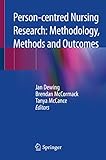Person-centred nursing research : methodology, methods and outcomes / Jan Dewing, Brendan McCormack, Tanya McCance, editors.
Material type: TextLanguage: English Publisher: Cham, Switzerland Springer 2021Description: xv, 169 pages : illustrations (some color) ; 24 cmContent type:
TextLanguage: English Publisher: Cham, Switzerland Springer 2021Description: xv, 169 pages : illustrations (some color) ; 24 cmContent type: - text
- unmediated
- volume
- 9783030278670
- 3030278670
- 610.73072 23
- WY 20.5
| Item type | Current library | Shelving location | Call number | Status | Date due | Barcode | Item holds | |
|---|---|---|---|---|---|---|---|---|
 General Book
General Book
|
Kuakarun Nursing Library | Processing unit | WY 20.5 P47 2021 (Browse shelf(Opens below)) | Available | 0000049462 |
Browsing Kuakarun Nursing Library shelves Close shelf browser (Hides shelf browser)

|

|

|

|

|

|

|
||
| WY 20.5 N974 1997 Nursing outcome classification (NOC) | WY 20.5 N974 2007 Nursing research : a qualitative perspective | WY 20.5 p 2018 Proposal writing for clinical nursing and DNP projects / | WY 20.5 P47 2021 Person-centred nursing research : methodology, methods and outcomes / | WY 20.5 P769e 1997 Essentials of nursing research | WY 20.5 P769e 2010 Essentials of nursing research : appraising evidence for nursing practice | WY 20.5 P769e 2018 Essentials of nursing research : appraising evidence for nursing practice / |
Includes bibliographical references.
Principles for Person-Centred Nursing Research -- The Person-Centred Nursing Framework -- Coming to Know Personhood: Philosophical ‘Dates’ -- Overviews of Person-Centred Practice Research -- Developing Theoretical Frameworks: Integrating Specific Values and Principles into Research -- Methodologies for Person-Centred Nursing Research -- Knowing How to Act: Person-Centred Research Methods -- Knowing, Being and Becoming in Person-Centred Research -- Phenomenological and Hermeneutic Approaches to Person-Centred Nursing Research -- The Contribution of Experimentation and Quasi-experimentation in Person-Centred Research -- Multiple and Mixed Methods Research -- Person-Centredness in Nursing Education Research -- Adopting a Person-Centred Approach in Doctoral Supervision -- Progressing Person-Centred Nursing Research
This book is the first ever to offer a contemporary collection of different perspectives on person-centredness in international doctoral nursing research. The research in the book is based on the ideas and values of personhood and person-centeredness, which have been used and can be seen to guide research approaches, inform research designs and theorize research findings. Further, a specific framework for person-centred nursing is embedded throughout the research studies presented in the text. The Person-centred Nursing Framework (PCNF) developed by Brendan McCormack and Tanya McCance in 2010, is recognized as a nursing theory and this book further develops it as a basis for research and for advancing person-centredness in nursing. The framework informs all stages of the research process, from design through to dissemination. The book is structured into a number of highly engaging chapters written by doctoral candidates, and recently graduated candidates. The opening and closing chapters, written by the editors, place the subsequent chapters in a global context of person-centredness and nursing. The potential for person-centred nursing research to be a global movement is recognized and debated. The subsequent chapters lead readers through philosophical ideas, methodologies and methods whilst also offering reflective and honest insights into learning how to become a person-centred researcher. This field is growing and developing but yet there is no specific book available. As a result, researchers spend considerable time and effort translating existing research methodologies into person-centred perspectives. This book fills this gap and acts as a key resource for future nurse researchers. The text is intended for, and benefits nursing doctoral candidates, masters candidates and academic staff who teach and supervise research candidates; it may also appeal to other graduate learners. The book has international contributions which makes it appealing internationally.
There are no comments on this title.

